Time Stamps:
Plausible Deniability - Opening Skit (0:00)
Introduction (2:54)
When a “Private Company Bro” Won't Leave You Alone (4:01)
Gabriel Kolko and the Triumph of Cronyism (7:19)
Karl Hess’ Exodus to Self-Management (11:01)
Banksters Serve Innocent Customers to Feds (18:22)
The Gaming Industry's Deep State Hunt For “Extremists” (24:30)
The OnStar Chamber Rules to Raise Rates on Car Insurance (26:51)
The Getaway Car of the Covid Regime (29:01)
The WEF's Pervasive Specter of Censorship (32:02)
The TikTok Ban is a Power-Grab and a Giveaway (35:57)
Closing Remarks (38:33)
The Fate of Liberty Under Crony Capitalism
Is it time for your state to consider a Consumer Bill of Rights?
I'm not talking about price controls or any other predatory intervention that ends up harming the people it claims to help.
I'm talking about protecting the same rights you demand unimpeded by a power-hungry government in an environment where corporate actors are encouraged to trample on them - often as a deputy for the state - and never in the service of activities that consumers wish to patronize.
How about the right to speak as you wish?
The right to keep and bear arms?
The right to go about your everyday life without having your pocket picked, your privacy compromised, or being profiled without any suspicious activity in your life to warrant such attention?
Libertarian circles are an excellent place to find passion for the defense of our liberties, but it always struck me as odd that many people within them only demanded the respect for their God-given rights from one institution in public life.
It was always odd that for some, "private company bro" justified activities by artificial persons operating in the same manner as the state that presumes your consent and asserts itself the weilder of power over your life.
Is there a functional distinction between the FBI showing up at your doorstep, demanding to see your internet history... and Best Buy assisting their warrantless snooping when all you did was take your electronic device to the Geek Squad for a repair?
How about your financial records?
Are you secure in your papers when Bank of America hands over your statements as though you're a criminal under investigation?
Or Dick's Sporting Goods?
What if you're glancing by the firearms section, and their video footage is handed off to the feds, eager to justify their suspicions of possible "extremists?"
They'd be poor sports, and that ain't good.
But they're "private," does that make it okay?
Gabriel Kolko and the Triumph of Cronyism
When Murray Rothbard wrote about the history of the Progressive Era, one of his main sources was Gabriel Kolko.
While Kolko was a man of the left, he understood and emphasized the dangers of collusion between big business and big government.
In 1963, Kolko published The Triumph of Conservatism, an indictment and revision of the so-called “Progressive Era.”
What Kolko calls "conservatism," we can observe as crony capitalism, not driven by honest dealings and customer satisfaction, so much as the obtainment of powerful connections and special privileges from the state.
While the semantics can be disputed, the elements of Kolko's points are to be considered and observed:
I use the attempt to preserve existing power and social relationships as the criterion for conservatism because none other has any practical meaning. Only if we mechanistically assume that government intervention in the economy, and a departure from orthodox laissez faire, automatically benefits the general welfare can we say that government economic regulation by its very nature is also progressive in the common meaning of that term. Each measure must be investigated for its intentions and consequences in altering the existing power arrangements, a task historians have largely neglected.
Kolko adds a startling realization.
"It [the 'Progressive Era'] was never a question of regulation or no regulation, of state control or laissez faire; there were, rather, the questions of what kind of regulation and by whom."
Furthermore:
Why did economic interests require and demand political intervention by the federal government and a reincarnation of the Hamiltonian unity of politics and economics? In part the answer is that the federal government was always, involved in the economy in various crucial ways... But the significant reason for many businessmen welcoming and working to increase federal intervention into their affairs has been virtually ignored by historians and economists. This oversight was due to the illusion that American industry was centralized and monopolized to such an extent that it could rationalize the activity in its various branches voluntarily. Quite the opposite was true.
Karl Hess’ Exodus to Self-Management
Another notable figure is the former speechwriter to Barry Goldwater, Karl Hess. From early on, Hess understood the many problems inherent in a powerful government. But later in life, Hess observed a similar case of bureaucracy and red tape that was holding many people back in corporate America, sucking away their potential and creativity.
Hess also saw a tremendous difference when it came to productive endeavors that weren't beholden to the suits of mega-corporations.
"During his exodus from political life, Hess began working welding jobs at night to make some extra money, repairing bulldozer blades, dump trucks, and trailers. Hess discovered that working on the construction site was a completely different dynamic than the corporate world of offices and spreadsheets. The experience led him to identify what he now considered contradiction in his thought. He believed people had enough common sense to run their lives without interference from government bureaucrats. However, Hess also believed people would only work efficiently with corporate bosses. But at work with other welders, mechanics, heavy-equipment operators, carpenters, steel riggers, electricians, pipefitters, and engineers, he discovered that the people he met absolutely could manage themselves and undertake productive work. In fact, unlike the corporate world Hess was accustomed to, the workers he met were not insular and competitive but cooperative when dealing with concrete situations. After he confronted this tension, Hess’s thinking evolved: He believed people could function without being managed and, in fact, might work better."
Perhaps his most notable contribution was his essay, The Death of Politics, originally published in Playboy magazine.
Big business in America today and for some years has been openly at war with competition and, thus, at war with laissez-faire capitalism. Big business supports a form of state capitalism in which government and big business act as partners. Criticism of this statist bent of big business comes more often from the left than from the right these days, and this is another factor making it difficult to tell the players apart. John Kenneth Galbraith, for instance, has most recently taken big business to task for its anticompetitive mentality. The right, meantime, blissfully defends big business as though it had not, in fact, become just the sort of bureaucratic, authoritarian force that rightists reflexively attack when it is governmental.
Furthermore:
Monopoly is a case in point. To suppose that anyone needs government protection from the creation of monopolies is to accept two suppositions: that monopoly is the natural direction of unregulated enterprise, and that technology is static. Neither, of course, is true. The great concentrations of economic power, which are called monopolies today, did not grow despite government's anti-monopolistic zeal. They grew, largely, because of government policies, such as those making it more profitable for small businesses to sell out to big companies rather than fight the tax code alone. Additionally, Federal fiscal and credit policies and Federal subsidies and contracts have all provided substantially more assistance to big and established companies than to smaller, potentially competitive ones.
Circling back to Live like a Libertarian:
"In his 1975 book Dear America, Hess disparages both corporate or crony capitalism and state socialism. Hess had a high opinion of free markets but a low opinion of large businesses. Crony capitalism is naked theft where business interests and the political class collude to live extremely high off of the work and creativity of others. Less brazen, state socialism cloaks itself in the aspirations of humane and cooperative living. Those aspirations are betrayed, however, by state socialism’s ruling class: obsessive book-keeping bureaucrats with absolute authority. Crony capitalism and state socialism, thought Hess, hold the same ultimate purpose: to produce a social order in which docile people follow the commands of a ruling class. Hess believed there were only two classes in America: the ruling and working classes. But for Hess, the working class is much larger than usually recognized by socialists and progressives. The working class starts with privileged professionals such as engineers, scientists, and managers insofar as they have much more in common with farmers, mechanics, and grocery clerks than the joint chiefs of staff, the leaders of political parties, and owners of corporate conglomerates."
Banksters Serve Innocent Customers to Feds
From the “secret portal” of 650-plus companies that have colluded with the FBI, Bank of America apparently went well beyond what the agency requested in a data dump against American citizens.
From the Interim Staff Report by the Committee on the Judiciary and the Select Subcommittee on the Weaponization of the Federal Government:
The Gaming Industry's Deep State Hunt For “Extremists”
Ken Klippenstein at The Intercept reports that multiple gaming platforms are “in dialogue” with the federal government in an effort to root out “domestic violent extremist content.”
"GAMING COMPANIES ARE coordinating with the FBI and Department of Homeland Security to root out so-called domestic violent extremist content, according to a new government report. Noting that mechanisms have been established with social media companies to police extremism, the report recommends that the national security agencies establish new and similar processes with the vast gaming industry.
The exact nature of the cooperation between federal agencies and video game companies, which has not been previously reported, is detailed in a new Government Accountability Office report. The report draws on interviews conducted with five gaming and social media companies including Roblox, an online gaming platform; Discord, a social media app commonly used by gamers; Reddit; as well as a game publisher and social media company that asked the GAO to remain anonymous."
Because anonymity is good for business.
The OnStar Chamber Rules to Raise Rates on Car Insurance
Car insurance rates up as drivers are shocked by data collection reports by Alex Hernandez
https://techaeris.com/2024/03/14/car-insurance-drivers-data-collection/
And why are your rates going up?
Because, citizen, you're being monitored as though you're under house arrest.
According to the New York Post, Kenn Dahl says his car insurance costs soared by 21% in 2022 after GM’s OnStar Smart Driver computerized system installed in his Chevy Bolt collected information about the particulars of his driving habits. Dahl said that his insurance agent told him the price increase was based on data collected by LexisNexis, which compiled a report tracking every time he and his wife drove their Chevy Bolt over a six-month period.
21 percent.
So, are these due to auto accidents? Speeding tickets? Racing in the parking lot?
I would think an auto insurer has plenty to go on with both the public knowledge available and the standard set of questions they ask in a quote assessment.
They can always adjust if you piled up speeding tickets or get in accidents.
Is it just me, or do we call it hacking when a natural person does this without permission?
The WEF's Pervasive Specter of Censorship
A Lily Bit breaks down the WEF's hostile stance against free speech in a recent Substack entry.
The World Economic Forum steadfastly attributes the crisis of trust in media to the pervasive specter of “disinformation.” This diagnosis, however simplistic, underpins their call for a societal crusade against misinformation, ostensibly to reclaim the lost sanctity of media trustworthiness.
It's a position that holds “trust” as the ultimate currency in the realm of media—a trust that emanates not from the relentless pursuit of truth, but from the ability to shape perceptions unchallenged.
The TikTok Ban is a Power-Grab and a Giveaway
The War on TikTok proposes a very limited benefit with a cost we were never meant to pay.
What I mean is this: the American Big Tech companies that acquiesced to the will of the Deep State to censor the Hunter Biden laptop story and promote lies about Russia and Donald Trump just got a lot more powerful with this giveaway.
Is Ron Paul correct in asserting that Congress' actions against TikTok may be the most dangerous infringement since the PATRIOT Act?
Maybe so.
Americans are being sanctioned economically now through demonetization and censorship through public and shameless pressure by the US government, and the corporate apparatus will almost always do their bidding as a proxy.
See Also:
Criminal Gangs and Getaway Cars
You get an A+ if you recognize the state as a criminal gang. But is this all just a philosophical abstraction that bears no truth outside of the fictional world? If a bank robber has a getaway driver, and they get caught, the getaway driver is complicit and without an excuse.
External Resources:
The Triumph of Conservatism: A Reinterpretation of American History by Gabriel Kolko
The Death of Politics by Karl Hess
Live like a Libertarian: Karl Hess by Portraits of Liberty
PDF: Financial Surveillance in The United States: How Federal Law Enforcement Commandeered Financial Institutions to Spy on Americans Interim Staff Report of the Committee on the Judiciary and the Select Subcommittee on the Weaponization of the Federal Government
The Feds Are Coming For "Extremist" Gamers by Ken Klippenstein
Car insurance rates up as drivers are shocked by data collection reports by Alex Hernandez
Your car is secretly spying on you and driving your insurance rates through the roof: report by Ariel Zilber
WEF Complains About Free Speech by A Lily Bit





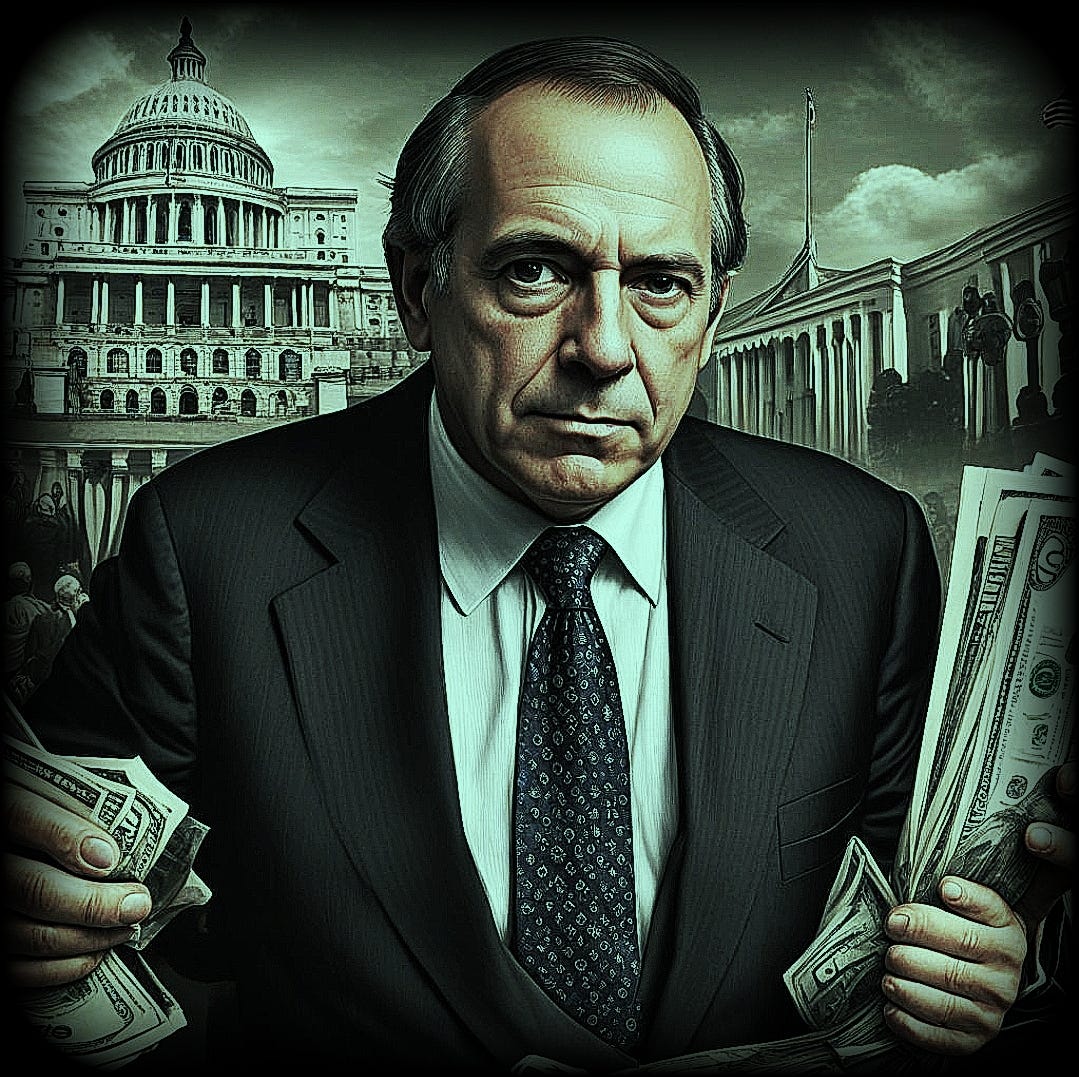
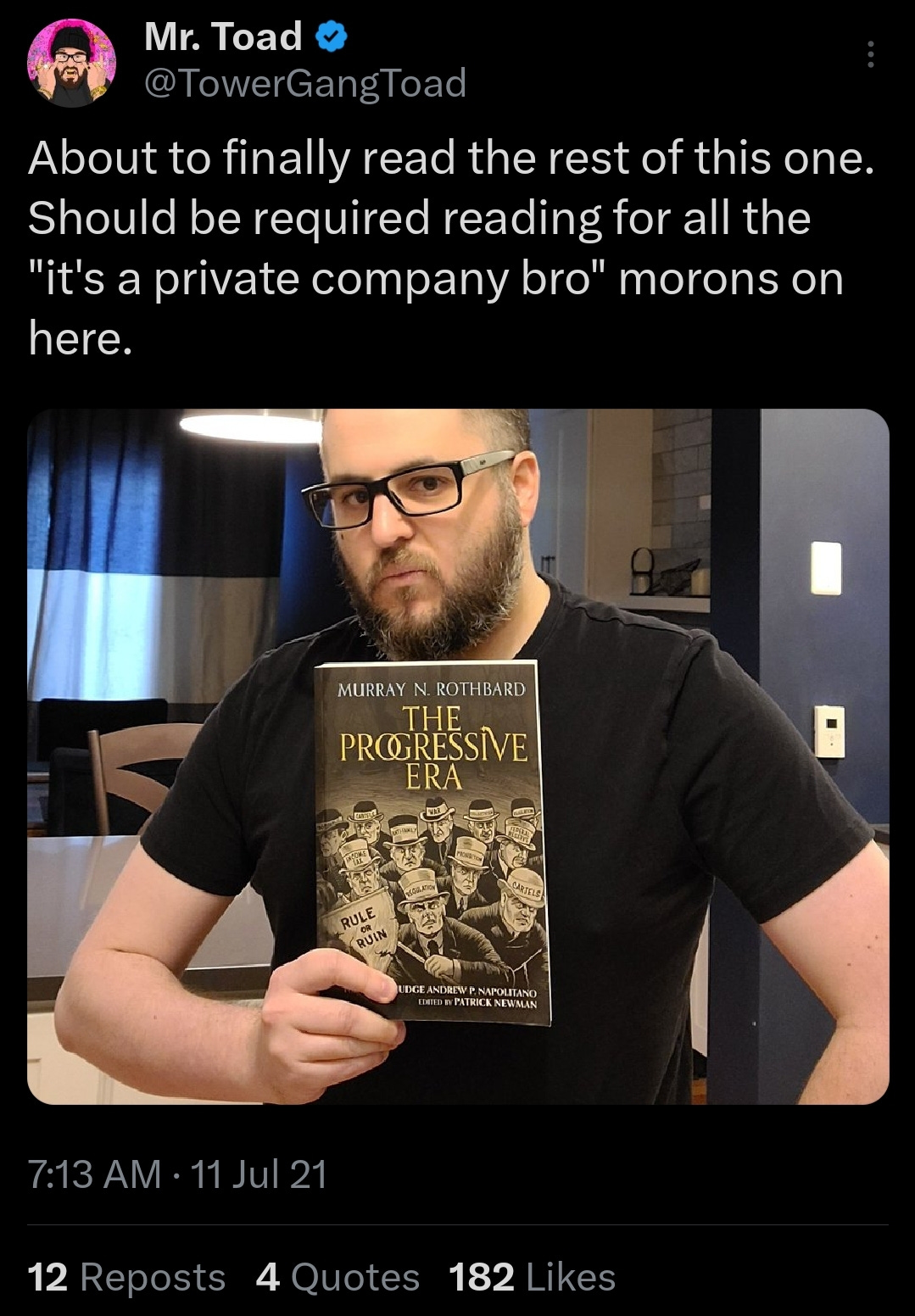
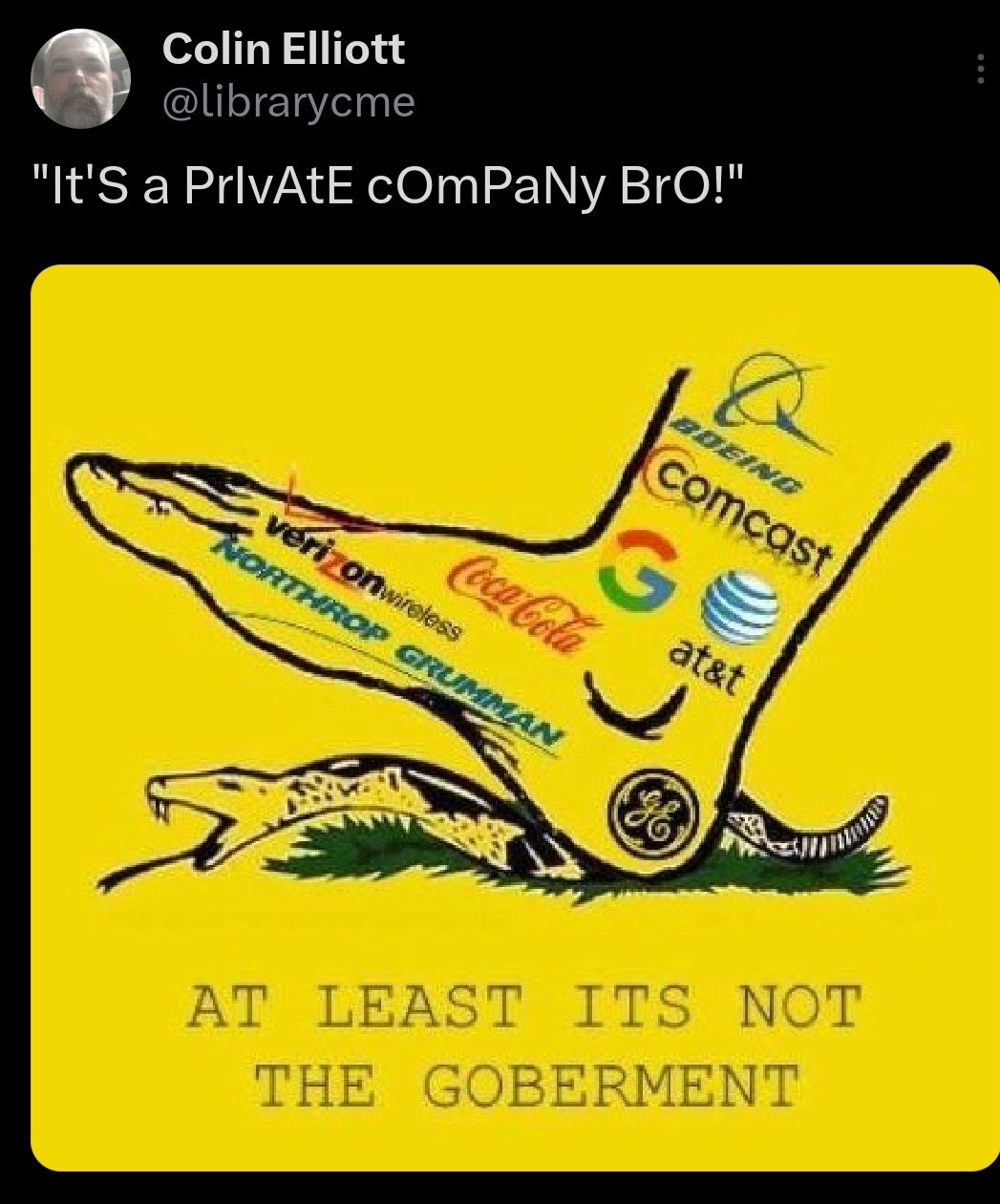
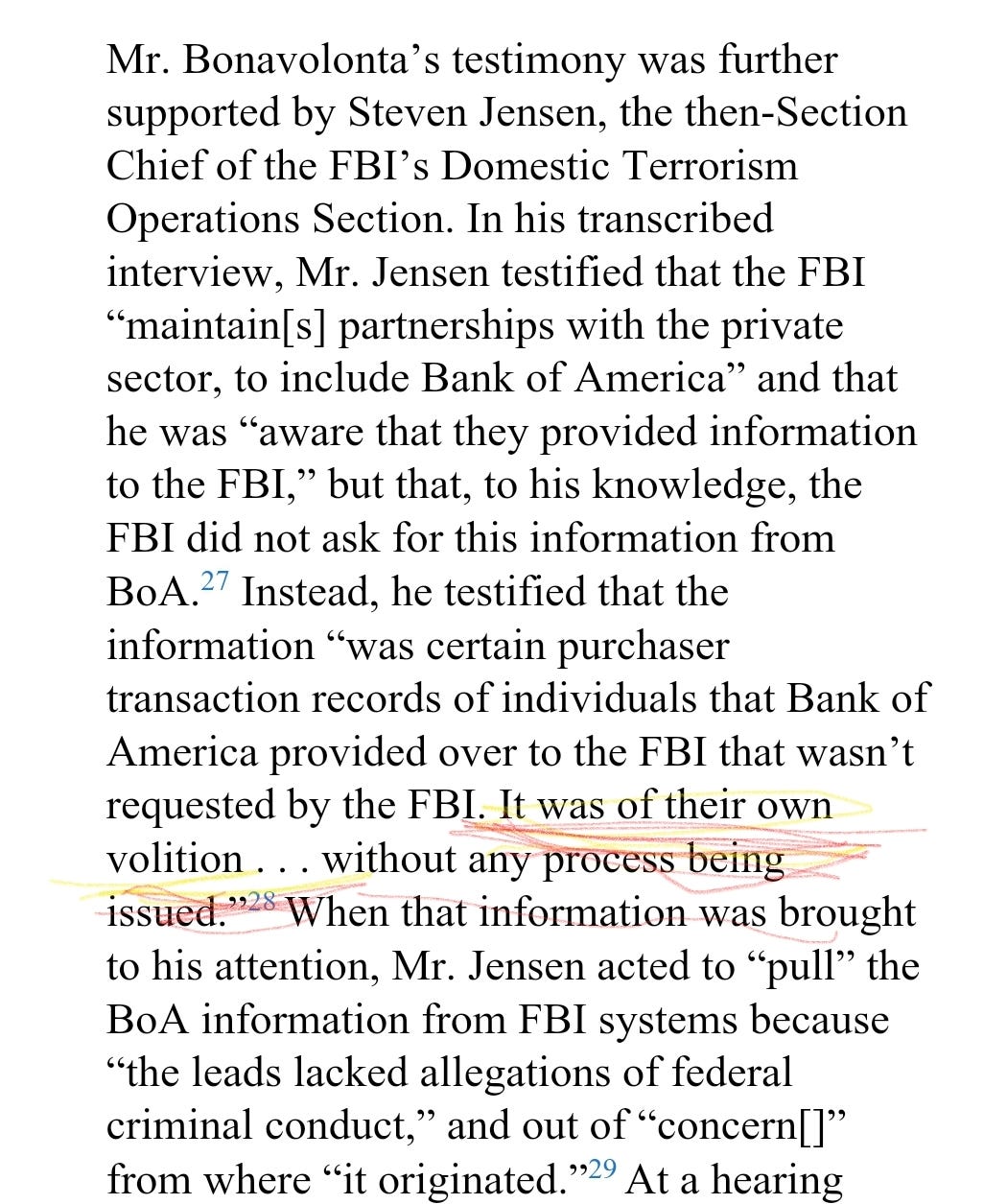

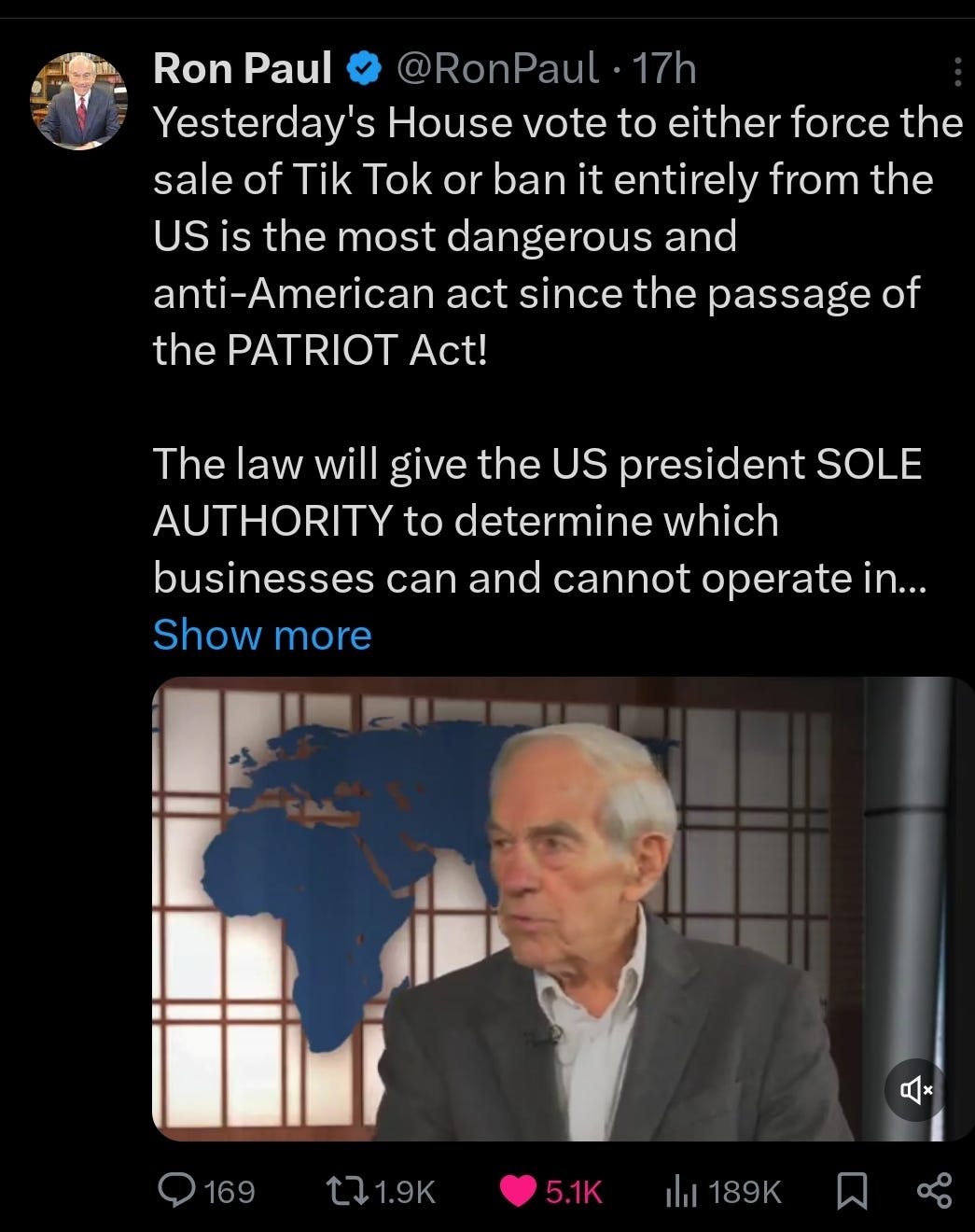
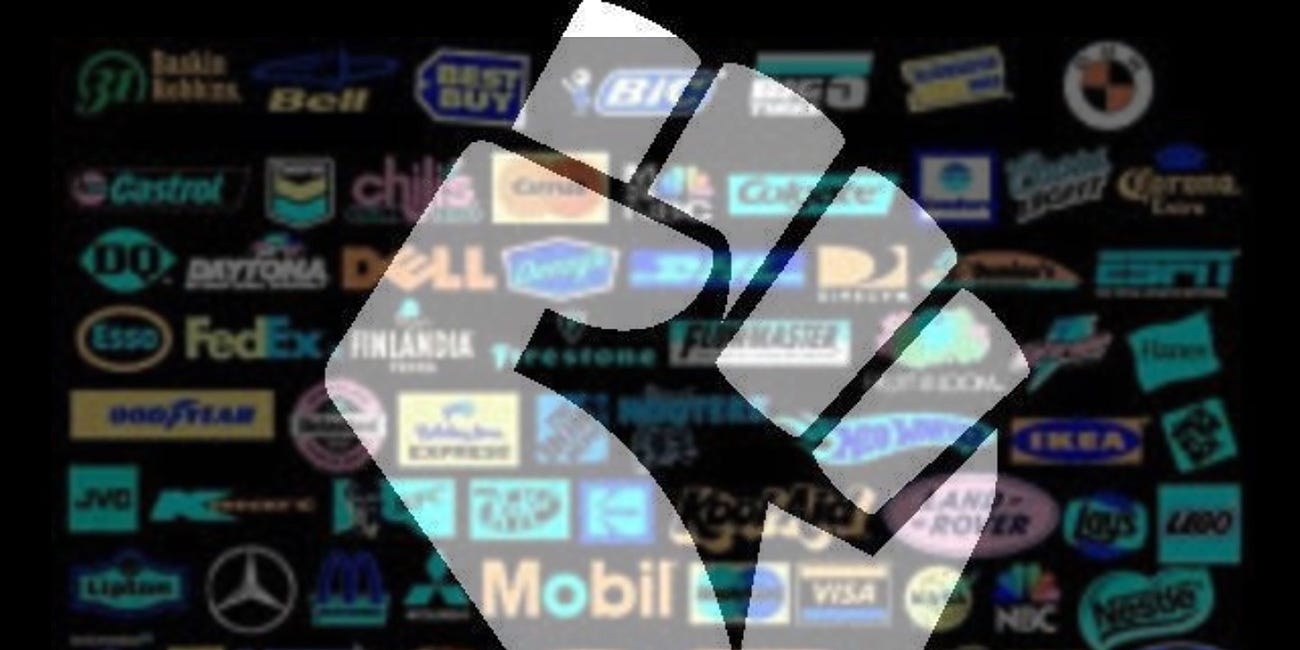





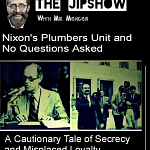



Share this post